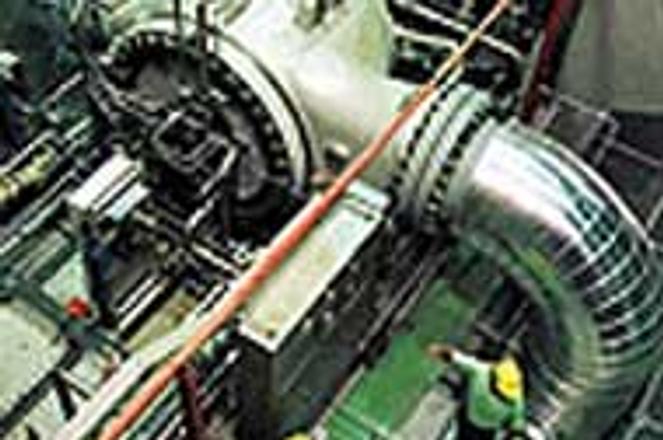Prime Minister Mikuláš Dzurinda faces off against the VSŽ Board of Directors on June 6.photo: TASR
After a weekend of hectic government negotiations, eastern Slovak steelmaker VSŽ emerged with fresh hope that a standstill agreement would finally be signed with all nine of its creditor banks, allowing the firm to take a loan and restructure. The company also emerged from the weekend with a new Chairman of its Board of Directors, chosen by the board during its June 6 meeting with Prime Minister Mikuláš Dzurinda.
Last November, VSŽ defaulted on a $35 million syndicated loan arranged by Merrill Lynch. Since then, the company has been constantly threatened by bankruptcy, and has been frantically been trying to shed itself of non-core activities like banking, media and a soccer team.
The government has taken an unusually close interest in keeping VSŽ alive, as the firm in previous years had generated 10% of Slovak exports and 7% of its GDP. More than 100,000 jobs, furthermore, are directly or indirectly supported by VSŽ activities.
The state's involvement in negotiations between VSŽ and its creditors has steadily increased over the last six months. Finally, on June 6, Finance Minister Brigita Schmögnerová was empowered by the cabinet to sign a stand-still contract between the state and VSŽ's foreign creditors.
The signing of such a contract - which pledges individual creditors not to try to recover their loans from VSŽ for a set period - will be followed by a loan that the creditor group will jointly extend to VSŽ in the amount of $50 million, according to Schmögnerová. The money will be used to restructure VSŽ's debt portfolio, beginning with repaying the $35 million Merrill Lynch credit.
"To be or not to be - that is what the signing of a stand-still agreement means for VSŽ", said VSŽ spokesman Jozef Marko in an interview with The Slovak Spectator on June 8. Marko would not divulge the amount that VSŽ owed to its nine creditors, and said that he expected an agreement to be hammered out "within the next few days."
Marko explained that while VSŽ had managed to bring production and sales back up to former levels over the last six months, the stand-still agreement was still essential to helping the firm recover financially.
VSŽ's planned profit for 1998 was 643 million Slovak crowns ($14 million), but financial results recently announced by the firm show instead a 11.06 billion crown loss for last year.
"This company [VSŽ] faces bankruptcy every day," said Marko. "Although our May 1999 sales are equal to our best sales month in the past, with 300,000 tonnes of production sold, we still have to resolve our financial situation, and that isn't possible without the signing of the stand-still agreement."
The stand-still agreement was originally to have been signed in March. The terms of the agreement had been set by the Co-ordinating Committee of Banks, which was formed last December to oversee VSŽ operations, and which consisted of eight foreign creditors such as ING Barings, Merrill Lynch and Morgan Stanley, and one Slovak creditor, the state-owned Všeobecná Úverová Banka (VÚB).
VÚB, however, stuck a spoke in the wheel in March by refusing to sign the contract. Bank spokesman Norbert Lazar said that VÚB had not signed the original agreement because "the agreement itself didn't reflect the better security that VÚB loans with VSŽ enjoyed in comparison with other creditors."
A bank source, speaking on condition of anonymity, explained that VSŽ's foreign creditors had extended loans to the steelmaker when it was in a far more healthy financial state. VÚB, meanwhile, had extended a loan when VSŽ was already in some difficulty, and thus had demanded higher security for its loans in the form of real estate.
"VÚB didn't sign the stand-still agreement because its loans were sufficiently guaranteed and they were not interested in the other creditors," agreed Marko.
But with the government now determined to push a stand-still agreement through, VÚB's indifference to a contract has turned into enthusiasm. The state still maintains a 51% majority in VÚB. "VÚB for its part appreciates the active participation of the state in talks and especially its effort to solve relations between VSŽ and its creditors," said Lazar, who said that he could not say when a stand-still agreement might be signed. "It's not up to VÚB," he said.
If all goes according to plan, and VSŽ receives a fresh cash injection of $50 million, the entrance of a foreign investor is next on the horizon. Economy Ministry spokeswoman Alica Ďurianová said that "the ministry is well-disposed towards the entrance of a foreign investor who has experience in the steel industry."
The bank source said that US Steel, which already has a joint venture with VSŽ, was "most likely to be chosen to restructure and consolidate VSŽ."
New chairman
On the same day that the government authorised Schmögnerová to negotiate an agreement with VSŽ's creditors, the steelmaker found itself with a new Chairman of the Board - Vladimír Repčák, formerly vice-president for finance, who replaced Ján Drábik.
Asked whether the appointment of Repčák was a quid pro quo for engineering a stand-still agreement, Marko refused to comment. But Vladimír Zlacky, an advisor to Deputy Prime Minister for Economy Ivan Mikloš, confirmed that "Vladimír Repčák is the government's representative at VSŽ. He is acceptable for both the government and the Board of Directors as well as international banks and institutions."
The VSŽ Board of Directors also voted on June 8 to prolong the contract of current VSŽ president Gabriel Eichler for a further six months. Eichler, former President of Bank of America and a respected figure in international financial circles, was elected president on December 11 to steer VSŽ out of its crisis.


